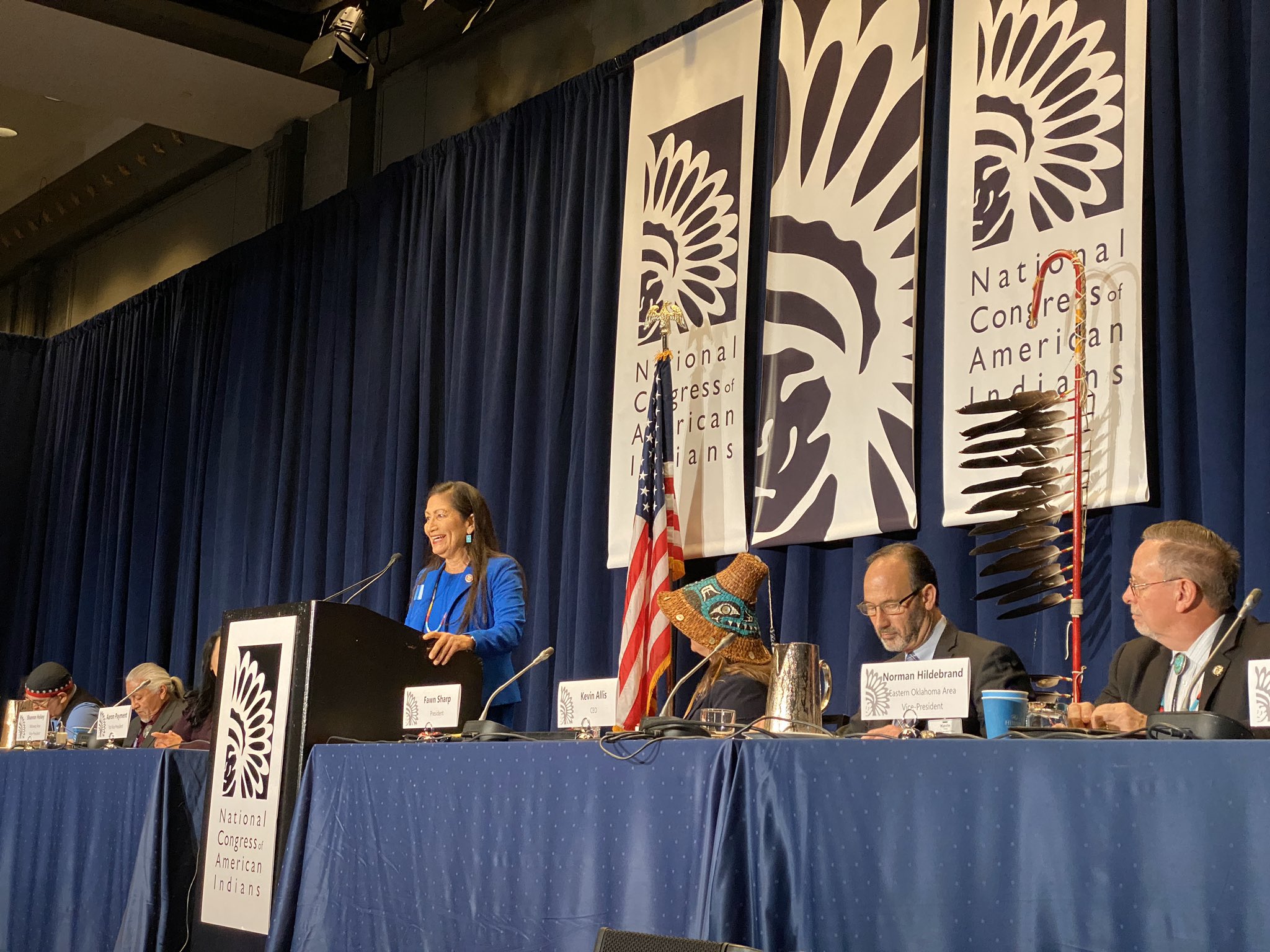
Rep. Deb Haaland (D-New Mexico) addresses the winter session of the National Congress of American Indians in Washington, D.C, on February 11, 2020. Photo by Indianz.Com
Washington, D.C. – As Congress prepares to pass emergency measures to address the coronavirus pandemic, Vice Chair of the House Committee on Natural Resources Deb Haaland (NM-01) and Chair of the Subcommittee of Indigenous People Ruben Gallego (Ariz.-07) introduced a bill to increase Tribal governments’ access to public health and preparedness programs. The CDC Tribal Public Health Security and Preparedness Act is the companion to the bill U.S. Senator Udall’s (D-NM) bill introduced yesterday.
Right now, Tribes are not eligible to apply for Centers for Disease Control (CDC) public health emergency preparedness (PHELP) program. Haaland’s bill would allow Tribes to apply directly to the CDC PHELP program and authorizes the CDC to make any necessary modifications to the program to fit the needs of Tribal applicants. The CDC PHEP grant program seeks to increase the capacity and response timelines of local public health entities during public health emergencies and states, territories, and some U.S. cities are eligible to apply.
“All government entities should have equal access to programs that help manage public health emergencies, but right now Tribes are left behind. My bill will ensure that Native Nations have the same access as everyone else to emergency programs and funding to keep our communities safe and healthy during the coronavirus outbreak and future public health threats,” said Congresswoman Deb Haaland, Co-Chair of the Congressional Native American Caucus.
“It is part of our legal federal trust responsibility to ensure that Tribal communities have the resources they need to prepare for and address public health emergencies like the one we are dealing with right now,” said Rep. Ruben Gallego, Chair of the Subcommittee for Indigenous Peoples. “This bill will bring parity to Tribal Nations when working with the CDC and protect the health and wellbeing of Native people. I am committed to working to pass this bill and to ensuring that Indian Country is not left behind in Congress’s efforts to combat the COVID-19 pandemic.”
“We need to ensure that Tribes have the same access to resources as everyone else to face down public health emergencies like the COVID-19 pandemic. While the Indian Health Service serves as the primary federal agency charged with providing healthcare in Indian Country, all federal agencies – including the CDC – share equally in the requirement to fulfill our trust and treaty obligations,” said Udall. “I’m proud to partner with Representatives Haaland and Gallego on this new legislation to improve Tribal access to federal resources meant to help communities better prepare for public health emergencies. As vice chairman of the Senate Committee on Indian Affairs, I will continue to push Congress and the Administration to make sure Indian Country has access to federal public health resources it needs and that there is meaningful engagement with Native communities and Tribal leaders in our national response to COVID-19.”
The bill is also supported by national Tribal health organizations:
National Council of Urban Indian Health (NCUIH):
“In times of emergency, it is critical that lives are not lost due to bureaucratic red tape. As CDC works to help prepare for public health emergencies like the COVID-19 pandemic, it is imperative that Indian Country is not left behind. We applaud Senator Udall’s continued to commitment to ensuring American Indians and Alaska Natives have access to the resources they need to address COVID-19.”
National Indian Health Board (NIHB):
“Disease knows no borders, and that includes the borders of American Indian and Alaska Native reservations, villages, and communities. Yet, since the birth of the PHEP program, the flow of public health emergency funds stopped at Indian Country’s borders. In the case of public health emergency preparedness, this nation’s First Peoples must not remain last in opportunity. CDC will now have the long-overdue means to embrace and meaningfully uphold its Trust responsibility for the health and public health of American Indian and Alaska Native Americans.”
In a House Committee on Oversight and Reform Committee hearing yesterday, Haaland pressed Administration officials on the lack of preparedness and President Trump’s inappropriate response to the coronavirus outbreak. After coronavirus cases were confirmed in New Mexico this week, Haaland remains in close contact with the New Mexico Department of Health, City of Albuquerque, and Centers for Disease Control. Last week, Haaland voted for Coronavirus Preparedness and Response Supplemental Appropriations Act is a strong $8.3 billion emergency supplemental package that will help prepare for the scale and seriousness of the public health threat posed by the coronavirus. Haaland launched a bilingual Coronavirus Info Center on her website to ensure residents in the district have easy access to prevention measures and the latest official information.
CDC Tribal Public Health Security and Preparedness Act: H.R.6274
H.R.6274: https://www.congress.gov/bill/116th-congress/house-bill/6274
HHS Small Ambulatory Program Awards $55 Million to 15 Tribes and Tribal Organizations (Indian Health Service)
Indian Health Service Announces New Deputy Director for Quality Health Care and Enterprise Risk Management (Indian Health Service)
Federal Emergency Management Agency (FEMA)
White House Office of Management and Budget (Joe Biden Administration)
Tuba City Regional Health Care Corporation (Arizona, Navajo Nation)
Oklahoma City Indian Clinic (OKCIC)
Indian Health Service (Department of Health and Human Services)
Navajo Nation Town Hall (Arizona, New Mexico, Utah)
Navajo Nation (Arizona, New Mexico, Utah)
Tribal organizations statement on advance appropriations for Indian Health Service
Indian Health Service Statement on Advance Appropriations (Department of Health and Human Services)
Indian Health Service (Department of Health and Human Services)
Indian Health Service (Department of Health and Human Services)
Navajo Nation (Arizona, New Mexico, Utah)
